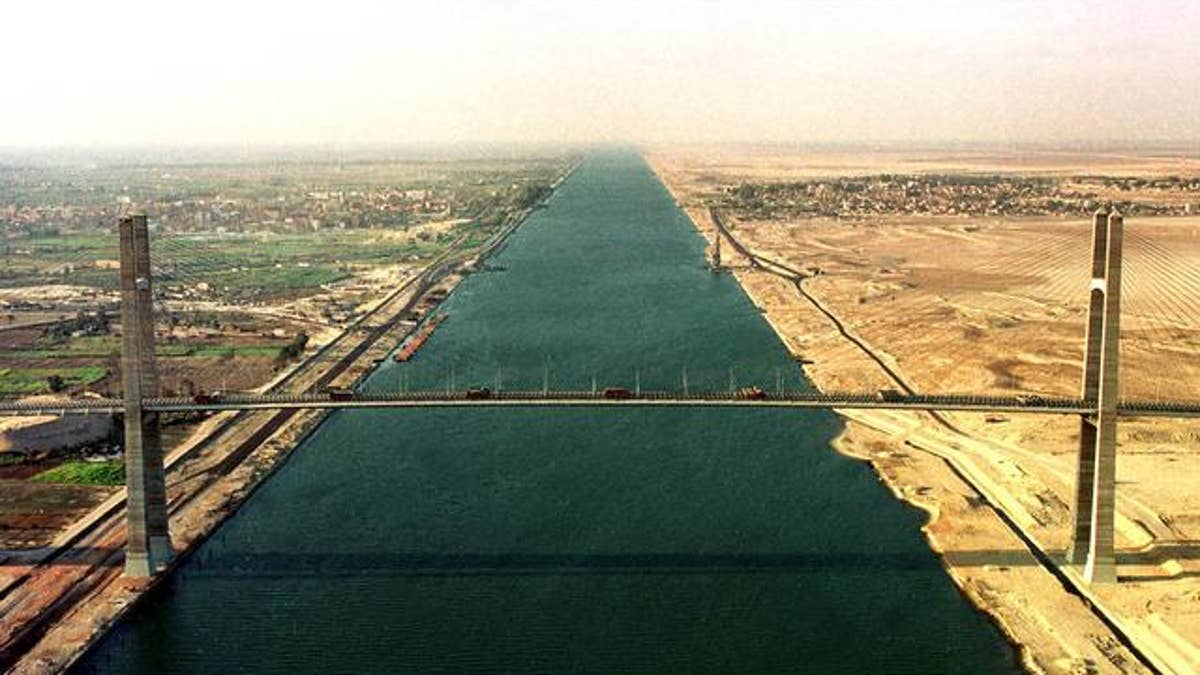
A 2001 file photo of the Suez Canal. Recent anti-presidential protests in Egypt have some concerned over whether or not ship traffic could be disrupted. (AP)
U.S. officials don’t want to talk about what might happen if the crisis in Egypt endangers international shipping -- and many of the world’s oil tankers -- through the Suez Canal.
“I'm not going to get into a series of hypotheticals,” White House Press Secretary Robert Gibbs said when asked how the U.S. might respond if Egyptian officials could no longer guarantee safe passage for the tens of thousands of ships that pass through the canal each year.
More than 35,000 ships crossed the Suez in 2009, about 10 percent of them oil tankers.
For now the canal remains open, and traffic is still flowing normally.
But how long that remains the case has some in the U.S. Congress calling for a contingency plan. Rep. Jeff Landry, a Louisiana Republican, says roughly the same amount of oil shipped daily through the Suez Canal can be produced each day in the Gulf of Mexico.
Landry is calling on President Obama to drop his "merit-less permitorium" and allow domestic drillers to get back to work.
"At any point in time, a conflict in the Middle East can erupt and hold our economy hostage because the President is fantasizing about an oil-free green energy policy," Landry said.
"Allowing production to occur in the Gulf of Mexico again will help alleviate the economic crisis of a Suez Canal shutdown and prevent Americans from waiting in long lines to pay $5 a gallon for gas."
Marvin Kalb, a Fox News contributor and senior fellow at the Joan Shorenstein Center on the Press, Politics and Public Policy added, "The control of the Suez Canal is central, and it's been central now for 100 years. Why? Not only commerce from Europe to the rest of the world, but oil coming around from the Arabian Peninsula."
If the Suez Canal were to close, oil tankers would be forced to sail around southern Africa -- adding some 6,000 miles to the journey.
One analyst said that translates to an extra 12 days traveling from Saudi Arabia to Houston.
James Hamilton, professor of economics at UC-San Diego, said shutting down the Suez Canal today wouldn't be as bad as the 1956-57 closure.
Hamilton points out there are now bigger tankers -- too big for the canal -- and pipelines.
The bigger issue, according to Hamilton, is whether the protests will spill over into other countries.
"If we did see something happening in places like Iran, or further difficulties in Iraq," Hamilton said.
Still, based solely on speculation and risk, experts say the price of crude oil has gone up $5.00 a barrel since Friday.
The Organization of the Petroleum Exporting Countries (OPEC) maintains the market is well supplied. “There are folks obviously in the NEC (National Economic Council) that are monitoring any impact that uncertainty or unrest has throughout the financial markets," Gibbs said.
"We have, thus far, to my knowledge, not seen disruptions in, for instance, in the Suez, which obviously is tremendously important to the movement of goods.”








































